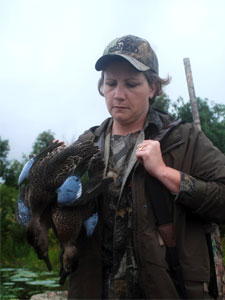Duck hunting: 3 Tips for Early Season Teal Success
 Blue-winged teal are very early migrators.
Blue-winged teal are very early migrators.
- Read more about Duck hunting: 3 Tips for Early Season Teal Success
- 8732 views
 Blue-winged teal are very early migrators.
Blue-winged teal are very early migrators.
With the duck season now closed almost everywhere, images of unfilled limits of ducks or geese linger on my mind along with all the mistakes I made. Perhaps you have started pulling your decoys and started cleaning them up for next year, too? Or, maybe you started putting your shotguns away in exchange for your favorite fishing rods? If some of you are like me, you are also thinking about those missed ducks and that wasted time spent chasing down cripples and wondering how that happened in the first place. Perhaps, like me, as well, you're kicking yourself for not practicing more?
 Duck calling is definitely a work of art. I would also submit that it can be an acquired skill. I'm not as seasoned a duck hunter as others, although I love duck hunting and one of my New Year's resolutions is to do more of it starting fall 2014.
Duck calling is definitely a work of art. I would also submit that it can be an acquired skill. I'm not as seasoned a duck hunter as others, although I love duck hunting and one of my New Year's resolutions is to do more of it starting fall 2014.
 This season started with a bang! The pun is intended.
This season started with a bang! The pun is intended.
By Dale D. Humburg, Ducks Unlimited chief scientist
The season's about half over. Ducks begin migrating south in late August and start northward in February. Late November is in fact about halfway through the birds' annual round-trip migration. For waterfowl hunters, the same schedule applies.
Mosquitoes early and iced-up decoys late characterize the seasonal transition for waterfowl hunters, whether in North Dakota or
 Every aspect of our society has become so pigeon holed, we all have become victims of the cookie cutter syndrome. If we see it on TV, or in a slick magazine, we copy it.
Every aspect of our society has become so pigeon holed, we all have become victims of the cookie cutter syndrome. If we see it on TV, or in a slick magazine, we copy it.

Larry Whiteley, host of the award-winning Outdoor World Radio shares five of his tride and true tips for hunting duck.
 My buddy to my right dodged as the gun barrel of the guy next to him swung through his zone of fire and pulled the trigger. The echo of the 3 and 1/2-inch magnum waterfowl load pained our ears.
My buddy to my right dodged as the gun barrel of the guy next to him swung through his zone of fire and pulled the trigger. The echo of the 3 and 1/2-inch magnum waterfowl load pained our ears.